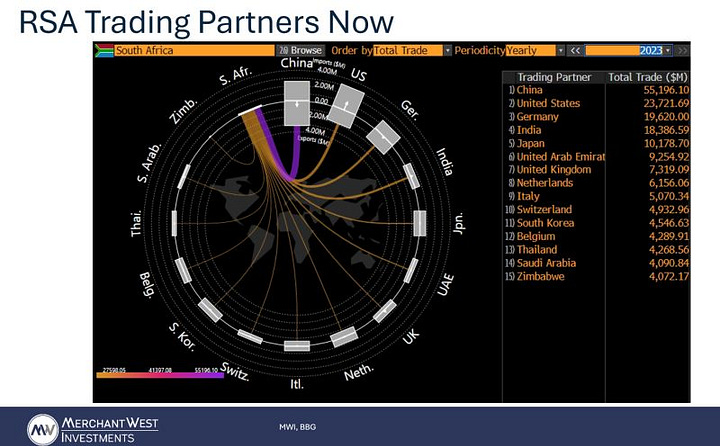Tariffs, Trade, and Trump's Misunderstandings
My lay economist reflections from the southern tip of Africa on Trump’s Liberation Day tariff broadside.


In 2000, China was South Africa’s 7th largest trading partner. Today, it’s first by a wide margin. That shift tells a broader story—not just about economics, but about the ANC’s alignment, dependency, and long-term vision.
South Africa’s export profile—rich in raw materials—meets China’s appetite for inputs to sustain industrial growth. On the surface, it’s a rational marriage of supply and demand. But trade is never just trade. It is also trust, influence, and leverage.
This week, Donald Trump announced retaliatory tariffs on South African goods, claiming an unfair trade imbalance and accusing SA of imposing a 60% tariff on US products. Johan Fourie has rightly called this out as nonsense—the real tariff levels are far lower and within global norms. Of the hundred US import product categories only two - second-hand clothes and tobacco - are above Trump's alleged 60% tariff rate.
More fundamentally, Trump’s fixation on trade deficits reflects an outdated mercantilist view of economics. As Thomas Sowell reminds us in Basic Economics:
“At one time, it was believed that importing more than was exported impoverished a nation because the difference... had to be paid in gold... However, as early as 1776, Adam Smith... argued that the real wealth of a nation consists of its goods and services, not its gold supply.”
A trade deficit is not theft—it is often just the flip side of capital inflows or consumer choice.
Trump’s tariffs may be grounded in economic fiction, but that doesn’t mean all is well on our side either. The ANC has too often mismanaged South Africa’s trade strategy—not by imposing high tariffs, but by lacking clarity, consistency, and foresight in navigating a shifting global order. While the China relationship has brought capital and demand, it has also further deepened structural dependencies. The real task ahead is neither to appease Washington nor to overcommit to Beijing, but to reclaim a principled trade posture—one that serves long-term national resilience over short-term political calculus.
In the absence of a coherent strategy, South Africa risks being shaped more by the gravitational pull of others than by its own economic priorities.


